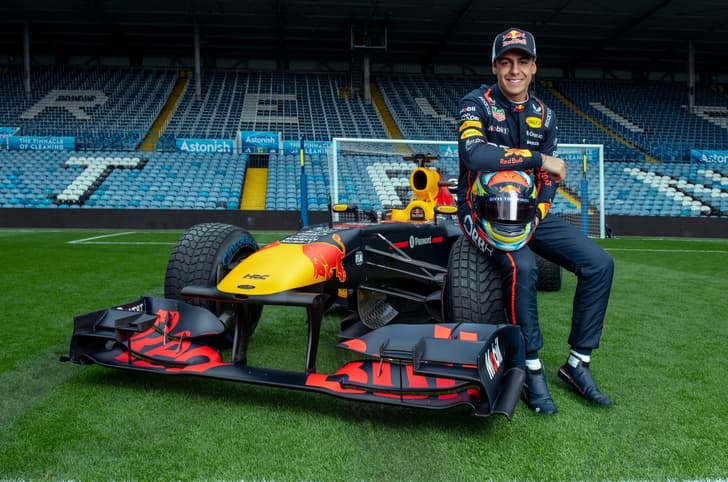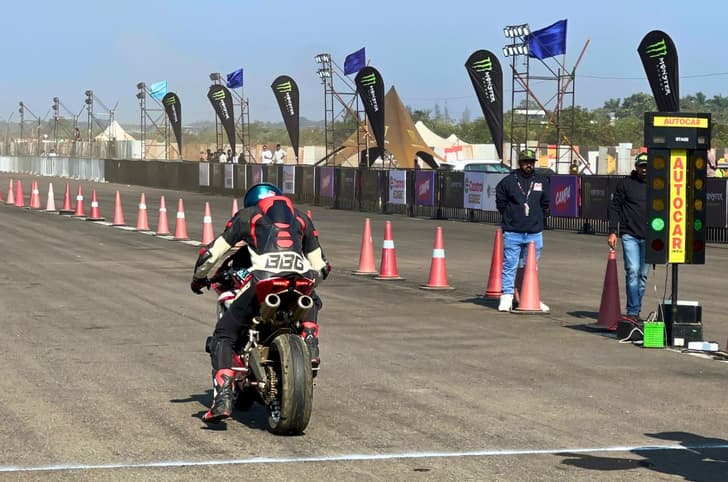Speaking to us ahead of the inaugural MotoGP race in India, Monster Energy Yamaha rider Franco Morbidelli discussed an array of topics, ranging from first impressions of the Buddh International Circuit (BIC) to the current state of affairs at Yamaha and MotoGP technical regulations.
Having clinched the rider’s world championship with Fabio Quartararo in 2021, the factory Yamaha squad has since seen a downturn in results, with Quartararo failing to defend his title last year, and languishing down in 11th place in this year’s championship standings. In that time period, Yamaha has gone from fielding four bikes in MotoGP (an extra pair in the RNF Yamaha independent team), to just the two bikes in the factory squad. When asked about how this has affected bike development, Franco Morbidelli said it wasn’t a very influential factor.
Yamaha’s performance struggles in recent times
In his words, “The problems that we are facing this year are similar to the previous years. For sure, when you’re struggling, more data can help you. So I think having more riders at your disposal can help for sure. But our problems have remained the same – it’s not the factor that has affected us this year. Over the last few years, it’s been Quartararo who has been able to push through and overcome the weakness of the package. This year, maybe that’s happened less and the two of us are more in the same boat.”
Another factor that Yamaha’s struggles have been attributed to is the factory’s continued use of an inline-four engine configuration; with the departure of Suzuki from MotoGP last year, the Yamaha YZR-M1 is now the only inline-four cylinder motorcycle on the MotoGP grid (the other four manufacturers use a V4 engine layout). However, once again, Morbidelli says that the issue isn’t necessarily down to engine configuration.
“Everybody else is racing a V4 engine, but Yamaha has great history with the inline-four. They have been able to win many championships and races with this configuration. I’m not an engineer and I don’t know in detail the positives and negatives of the two structures, maybe I’ll be able to tell you better next year (cheekily referring to his departure from Yamaha to Prima Pramac Ducati at the close of this season). But I believe that there is more potential or power in this, to reach the top even with an inline-four. Right now, our engine is still not on the level of our competitors, and we actually lost some rideability to add the extra power we’ve found this year. So the engine has become more nervous, more angry. Yes, it delivers more power, but to get that, we gave away some rideability,” said Morbidelli.
First impressions of the Buddh International Circuit
Speaking about his first impressions of the Buddh International Circuit, the Italian said, “The track is wonderful. Elevation changes, tricky corners, banking, it looks like an exciting track and I’m sure it will be tomorrow on the bike as well. I think turn 10 should really suit the Yamaha, that’s a corner where our bike should work well.” However, it was not all good news. “The only thing is that in some places the run-off area is a cause for concern. Turn 2 is a corner where we will be carrying a lot of speed and the run-off area is pretty short, and turn 4 we arrive there at a very high speed and the run-off area is very short. Turn 12 is a very fast right, and that’s also an area of concern.” said Morbidelli. Changes have been made to various areas of the track after the FIM visited the BIC earlier this year, but a majority of the riders have still expressed concern over the run-off areas in a few spots. That said, the overall level of safety would still appear satisfactory enough for the race weekend to go ahead as planned.
Aerodynamics in MotoGP: good or bad?
As MotoGP makes its debut in India, aerodynamics continues to be a big talking point in the series. With a 1km+ back straight, the BIC features the 6th longest straight on the MotoGP calendar, and aerodynamics could play a big role here. Speaking about what effect the winglets and various other aero appendages have had on MotoGP machines, Morbidelli confidently states that they are definitely more of a help than a risk.
“I like aerodynamics on the bike. Aerodynamics go against the top speed, but it helps in many other areas, especially in terms of controlling wheelie, so it’s a give and take. Aerodynamics change the whole character of the bike. These bikes are very powerful, very peaky, very angry. And as soon as you put aerodynamics on them, they relax, and they are more rideable. The rider is able to extract more from the package. Every aerodynamic item that the engineers put on the bike actually helps settle down the bike and control the huge power,” said Morbidelli.
He then went on to give a practical explanation of how the downforce-generating wings are making the sport safer: “The biggest impact is that up until a few years ago, braking with MotoGP bikes was very tricky. In many braking zones, you would reach the braking point with the front tyre either entirely up in the air, or feeling very light. It was very important for the rider to be careful of the front tyre before braking, and make sure it was really on the ground before braking. Now this is an issue that has completely gone away, because the faster you go, the harder the wings are pushing the front tyre into the ground, so that improves the comfort during braking very much, also improving safety.”
Morbidelli will compete in practice sessions, qualifying, a sprint race and the main race on Sunday, along with the rest of the MotoGP grid. You can read all about the very first Indian MotoGP round here.






























